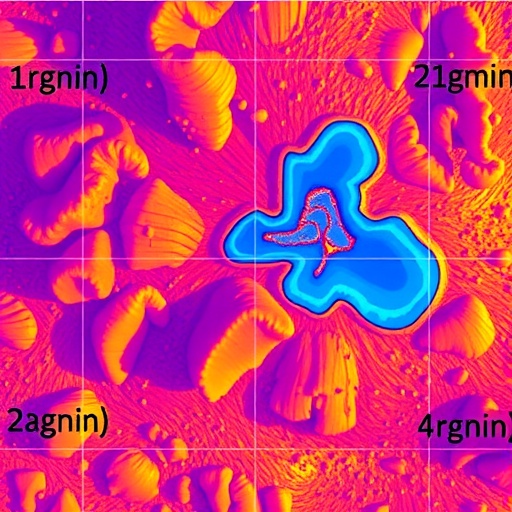Researchers have recently unveiled significant advances in understanding the proteomic landscape of prostate cancer, particularly focusing on metastatic castrate-resistant prostate cancer (mCRPC). This critical work, involving a collaborative effort of scientists such as Lee, Shen, and Fadlullah, offers new insights into the complexities of this disease, which is known for its aggressive nature and resistance to standard therapies. The complete analysis and findings are set to have profound implications for clinical practice and patient management in oncology.
Metastatic castrate-resistant prostate cancer is characterized by the continued growth of prostate cancer cells despite hormone therapy aimed at lowering testosterone levels. This condition presents unique challenges in treatment because of its ability to adapt and create mechanisms for survival, making it a pressing focus for researchers. Elevated markers and proteins found in the circulatory systems of affected patients serve as potential indicators of disease progression and therapeutic response, which is why this recent study has garnered significant attention in the scientific community.
By leveraging sophisticated proteomic profiling techniques, the researchers were able to identify and characterize various proteins present in the circulation of mCRPC patients. This comprehensive analysis revealed a distinctive proteomic signature associated with the disease, which could serve as a crucial tool in both prognosis and therapeutic decision-making. Notably, the identification of specific biomarkers could pave the way for personalized treatment strategies, tailoring therapies based on unique tumor profiles.
Prostate cancer remains one of the leading causes of cancer-related morbidity and mortality among men worldwide. The emergence of mCRPC marks a critical turning point in the disease’s progression, necessitating innovative approaches to both diagnosis and treatment. Current standard therapies often fall short in effectively managing resistant forms of cancer, highlighting the urgent need for novel interventions. The use of proteomics to establish a clearer understanding of mCRPC is a promising avenue that researchers are eager to explore.
Among the most striking findings of the study was the discovery of various protein modifications and the roles they play in enhancing tumor survival and growth. These modifications can significantly impact the function of the proteins involved in key cellular processes, including proliferation, survival, and interaction with microenvironments that support tumorigenesis. The results indicate that examining these circulatory proteins could yield insights into their contributions to metastatic behavior in prostate cancer cells.
Moreover, the study delves into the potential mechanisms through which circulating proteins engage with the immune system. Understanding how these proteins interact with immune cells may help in designing therapies that may enhance the immune response against prostate tumors. It opens the door to immunotherapeutic approaches, which are currently revolutionizing the treatment landscape of various cancers.
The research’s implications extend beyond merely identifying biomarkers. The relationship between specific protein signatures and clinical outcomes offers an opportunity for developing prognostic tools. Clinicians could potentially utilize these biomarkers to predict disease progression, enabling timely and targeted therapeutic interventions that may improve patient outcomes. The identification of prognostic factors that correlate with treatment response may also fine-tune patient management in oncology departments.
Future studies will likely expand on these findings, aiming to validate the clinical utility of the identified biomarkers in larger patient cohorts. An exploration of the dynamic changes in proteomic profiles throughout the treatment journey of mCRPC patients could enhance our understanding of disease evolution. Leveraging this knowledge would facilitate the development of adaptive therapy strategies that account for the tumor’s heterogeneity and its evolving landscape in response to treatment.
It’s also worth noting the multidisciplinary approach adopted by the researchers. Integrating proteomics with other omics technologies, such as genomics and transcriptomics, could unveil additional dimensions of the disease. Insights gleaned from correlating genomic mutations with proteomic alterations might further elucidate the mechanisms underlying mCRPC and how these influence treatment responses.
Such advances not only emphasize the importance of proteomics in cancer research but also serve as a reminder of the collaborative effort needed to address complex medical challenges. Innovations in cancer treatment and patient care stem from a diverse array of disciplines, underscoring the power of teamwork in tackling diseases like prostate cancer.
As researchers continue to push the boundaries of our understanding of mCRPC, there is a growing body of evidence suggesting the significant role proteomics will play in future cancer diagnostics and therapeutics. The findings from Lee et al. might well serve as a springboard for future investigations aimed at enhancing survival rates and quality of life for patients battling this formidable illness.
Overall, the meticulous work detailed in their study showcases not only the cutting-edge methodologies employed but also the potential for real-world applications that can profoundly affect patient care. The urgent need for effective management strategies for advanced prostate cancer is a rallying call for researchers and clinicians alike, driving forward the quest for improved outcomes.
In conclusion, the ongoing exploration and understanding of the circulatory proteome in metastatic castrate-resistant prostate cancer present an exciting frontier in the field of oncology. As these findings are translated into clinical practice, the hope is to bring forth innovations that make meaningful differences in the lives of those afflicted with this challenging disease.
Subject of Research: The proteomic landscape of metastatic castrate-resistant prostate cancer and associated prognostic biomarkers.
Article Title: Circulatory prostate cancer proteome landscapes and prognostic biomarkers in metastatic castrate resistant prostate cancer.
Article References:
Lee, H., Shen, J., Fadlullah, M.Z. et al. Circulatory prostate cancer proteome landscapes and prognostic biomarkers in metastatic castrate resistant prostate cancer.
Clin Proteom 22, 13 (2025). https://doi.org/10.1186/s12014-025-09536-6
Image Credits: AI Generated
DOI: 10.1186/s12014-025-09536-6
Keywords: prostate cancer, metastasis, proteomics, biomarkers, therapy, immunotherapy, clinical research, oncology.
Tags: advanced cancer treatment strategiescancer patient managementcancer research collaborationsclinical implications of biomarkersdisease progression indicatorsinnovative cancer diagnosticsmCRPC biomarkersmetastatic castrate-resistant prostate cancerprostate cancer researchprotein profiling in oncologyproteomic landscape of cancertherapeutic resistance in prostate cancer





